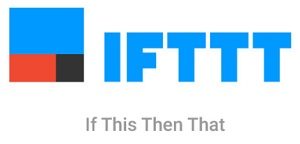IFTTT Co-Founder Linden Tibbets Steps Down as CEO, Replaced by Turnaround Specialist Chris Kibarian
After raising $24 million in funding led by Salesforce in April 2018, the startup IFTTT — which provides an API platform so that people can create short scripts for apps to work together — has announced that its co-founder Linden Tibbets has stepped down as CEO after 10 years leading the company. Chris Kibarian, who most recently was the CEO of Monster.com owner Randstad Digital Ventures, has taken on the role, and joined the board in the process. Tibbets, meanwhile, is staying on as IFTTT’s chief design officer.
Kibarian is a self-described turnaround specialist who has worked across a diverse set of businesses. In addition to restructuring Monster — a legacy from the first dot-com boom that was acquired for $429 million in 2016 — it got causes-based crowdfunding platform YouCaring into fighting form under its private equity owner. (YouCaring eventually bought Generosity.com from Indiegogo and then itself got acquired by GoFundMe.)
At IFTTT, his task will be to “realize IFTTT’s full potential and become the connectivity platform trusted by every person and business in the world,” Tibbets notes in a Medium post.
It’s notable that when IFTTT announced $24 million in funding last year, it was the first infusion of money to come to the company in four years — a relatively long time in the world of Silicon Valley startups. In the interim the company had made a few moves to launch new products, including those generating revenue, but had largely operated without much fanfare or attention (a little like the functional premise of IFTTT itself, to be honest).
On the other hand, the startup has some strong investors who appear to be rooting for it. In addition to Salesforce, its backers include IBM and the Chamberlain Group (best known for a variety of brands for automatic entry gates and garage door openers), Fenox Venture Capital, Andreessen Horowitz, Betaworks, Greylock, NEA, Norwest, SV Angels and more.
And in another, if modest, sign of optimism, between 2014 and 2018 IFTTT’s valuation went up. Its current valuation, according to PitchBook, is $249 million, compared to its post-money valuation of just under $210 million in 2014.
However, looking at the wider industry, you can see where IFTTT may have stalled in its growth, or at least in realising its full potential, as Tibbets puts it.
Tibbets writes that 2018 was “the best year in our company’s history” — noting record usage and over 700 services available for linking on its platform across verticals like retail, banking, food, automotive, government, health, education, and entertainment — but he doesn’t break out any specific usage numbers.
Last year, when it announced funding, the company said it had 14 million registered consumers (it did not disclose how many were active), 75 million Applets since launch, more than 5,000 active developers building services and more than 140,000 building Applets on the IFTTT Platform. Products from Google, Microsoft, Amazon, Twitter, BMW, Samsung, IBM, MyQ, and Verizon are among those touched by IFTTT scripts.
However, the wider landscape for connecting different apps together (IFTTT stands for “if this then that”) has been a tricky one to develop as a business.
Ordinary consumers — beyond early-adopting power users — may not be as likely to want to build such scripts (or “recipes” as IFTTT once called them before rebranding to “Applets”), and the most obvious integrations now often come as standard features in products or apps themselves.
Developers, meanwhile, may want to write their own scripts or use more sophisticated platforms that can provide deeper analytics or functionality around an integration. (For example, there are competing services like Microsoft’s Flow, and products that provide their own integration functionality that replace the need for using IFTTT, such as Alexa from Amazon, even while there are also ways to write integration scripts for Amazon products via IFTTT.)
“The biggest development in 2018 wasn’t growth in usage or our ecosystem, but growth for our business,” Tibbets writes tellingly. “We found concrete validation that connectivity is a real challenge for any brand looking to grow and retain their customers.”
I had thought that was actually IFTTT’s mission from the start. More to the point, if Kibarian can best figure out how to fit IFTTT into the current market, then that might turn out to be the most lucrative Applet of all.

